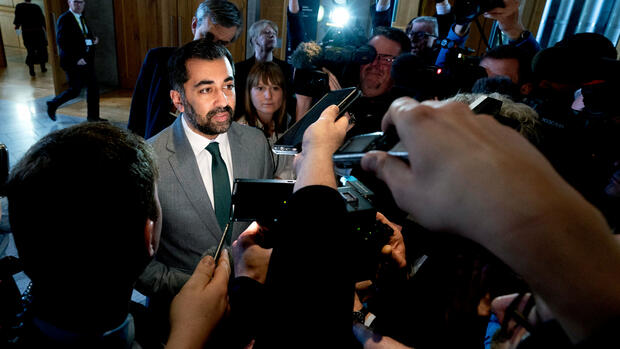London. When Humza Yousaf first met British Prime Minister Rishi Sunak earlier this week, the new leader of the Scottish National Party (SNP) and First Minister of the Scottish Regional Government immediately called for a new referendum on Scottish independence.
However, it was nothing more than a compulsory exercise. Scotland is further away from quick independence today than it was at the last referendum in 2014. “Yousaf’s demand is like shadow boxing,” says James Mitchell, a political scientist at the University of Edinburgh. Surveys showed that there is still no majority for Scotland to go it alone. In fact, according to a poll by Yougov, only 39 percent of Scots are now pro-independence. In 2014 it was 45 percent. “And that’s also due to the desolate state of the SNP,” says Mitchell.
The scientist is not alone in his assessment. The events of the past few weeks could not have been imagined in her “worst nightmares,” said Nicola Sturgeon, who resigned in March after nearly a decade as SNP leader and head of the regional government.
What happened? Shortly after Sturgeon’s resignation, her husband, Peter Murrell, who was the SNP’s general secretary for many years, was arrested and questioned by police.
The background is a political thriller with dubious loans, possibly slush funds – and a motorhome costing more than 100,000 euros. Since 2021, the police have been investigating whether party donations of £600,000 collected by the SNP for the independence movement have flowed into other, inappropriate channels. The party leadership denies this and has rejected all allegations.
That hasn’t stopped Edinburgh police from arresting SNP Treasurer Colin Beattie, who has since resigned, after Murrell. Both politicians have since been released without charge. What remains are many unanswered questions. For example, who bought the luxury RV that police seized outside Murrell’s childhood home, which the SNP now claims was originally intended to be used as a “campaign bus.” In any case, Beattie states that as treasurer he was not aware of the purchase.
SNP could not show a new path to independence
But the most important question is: What did Sturgeon know, and did she want to forestall the financial scandal that was uncovered shortly afterwards with her resignation? “I understand some people’s view that I knew this was going to develop and that’s why I left,” Sturgeon said this week, but she insists “nothing could be further from the truth.” The former SNP boss has not yet been questioned by the police.
Shortly after Sturgeon’s resignation as head of government in Scotland, her husband, who had been the SNP’s general secretary for many years, was arrested.
(Photo: AP)
Things could hardly get any worse for Yousaf, who is only 38 years old and is the leader of an ailing and seemingly disoriented party. “The SNP has had a good reputation as a governing party, not only because it campaigns for independence,” states political scientist Mitchell, “but its reputation is now ruined.”
So far, the nationalists have not succeeded in showing a viable path to independence after the failed referendum. Attempts to reschedule the vote have been rejected by either central government in London or the Supreme Court.
There are also serious economic and social problems. Scotland’s economy has benefited from the oil and gas resources of the North Sea for many decades. The SNP, together with the Greens, is trying to steer the Scottish economy on a sustainable course with a high quality of life. However, without the revenues from fossil fuels, the Scottish economy is lagging behind the rest of the UK.
Scotland has problems in education and healthcare
Elsewhere, too, things are crunching: the waiting lists in hospitals are longer, the shortage of staff in the schools is greater, and the grades of the students are often worse than in the rest of the kingdom. “An independent Scotland would need faster growth,” David Phillips of the Institute for Fiscal Studies in London told Bloomberg. After all, it is not only the fiscal transfers from London that need to be offset, but also the losses from the drop in oil and gas revenues.
This is an “extremely difficult job” for any politician, says Mitchell. Yousaf, who only just won the race to succeed Sturgeon and has at most a small base in the SNP, doesn’t think he’s capable of that. The political scientist speculates that the SNP will probably remain the strongest party in Scotland in the next general election. “But the Labor Party will benefit from the nationalists’ weakness and gain seats, especially if they have a chance of winning Westminster.”
More: Successor to Nicola Sturgeon: Humza Yousaf leads the Scottish Nationalists
